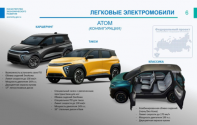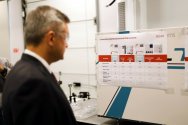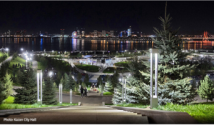some more info oabout research in quantum, space, AI.
The two articles about Russia research in microelectronics. The Academy head is confident that Russia can achieve technical sovereignty.
They are building new clean rooms in several places. It show they are confident of building the equipment that will install in those clean rooms. Russian cleanroom will be far cheaper than European but still number is in several billion dollars not in tens of billions.
On Nature-Like Technologies and Quantum Network
An important direction for the development of science in Russia will be the restart of fundamental research. This is especially relevant against the backdrop of scientists returning home after the European Organization for Nuclear Research (CERN) ended its cooperation with them. "And in this sense, we have every opportunity for a technological breakthrough," Mikhail Kovalchuk emphasized.
Among other priority areas of the Kurchatov Institute are the development of nature-like technologies and a genetic program. Mikhail Kovalchuk touched upon programs for the development of agriculture. In particular, in this sector, the Russian Federation needs to stop depending on large Western corporations in the area of creating and maintaining genetic material for food production, Pavel Volchkov, head of the MIPT genomic engineering laboratory, explained to Izvestia.
Also, Russian scientists working at the Kurchatov Institute National Research Center are developing neuromorphic microelectronics and a quantum network as part of the network research infrastructure, the head of the scientific center said.
"We are working on fundamentally new neuromorphic microelectronics. Today, we have concentrated almost all, almost 100% of the network infrastructure for science, the entire supercomputer part, all the networks - 20 thousand km of networks, uniting hundreds of scientific institutes and universities," the scientist added.
According to Igor Pivovarov, chief analyst at the MIPT Center for Artificial Intelligence, the creation of neuromorphic computing networks opens up great prospects for the development of more powerful computers.
— Modern software artificial neural networks (ANN) are a mathematical model of brain neurons, united into large arrays. But they are still calculated on conventional processors. If the processors themselves are made according to the neuron principle, then they will be thousands of times faster. And if you assemble such artificial neurons, that is, unite them into a network, then you will get a neuromorphic computer. Such a network is 1,000 times faster and requires very little energy, — he explained.
In addition, the program for creating unique mega-installations throughout the country is in full swing, the head of the Kurchatov Institute recalled. According to his estimates, in the next five to eight years, Russia will have the best research infrastructure in the world.
On the conquest of space
In addition, the National Research Center is developing plasma electrodeless engines for deep space flights.
— Today we fly into space like Munchausen on a cannonball. Our RD-180 engine worked for three hundred seconds, gave a kick, and we flew along ballistic trajectories that we cannot influence. And we need to patrol, land on the Moon, — said Mikhail Kovalchuk.
Now, according to him, the institute has prototypes of engines that provide a completely different thrust for flight. For example, a lunar station based on the principle of the "Selena" battery, Mikhail Kovalchuk noted. This is a self-regulating nuclear station based on the principles of direct energy conversion.
— The Kurchatov Institute Research Center is working on a project for a nuclear power plant operating in space. It may have different names. The project was launched back in Soviet times, but the public phase began in 2009. It will take a lot of time to implement, because it is a breakthrough technology. It needs to combine two areas that were previously developing in parallel: nuclear energy and space exploration, — said Andrei Ionin.
The two articles about Russia research in microelectronics. The Academy head is confident that Russia can achieve technical sovereignty.
The Russian Academy of Sciences spoke about Russia's leadership in many areas of microelectronics
President of the Academy of Sciences Gennady Krasnikov emphasized that the scientific base in this area has always been at a high level, but the implementation of developments was slowed down by low investments in the industry.
SIRIUS /Federal territory/, September 23. /TASS/. The developments of Russian scientists in a number of areas in the field of microelectronics occupy leading positions in the world. This was stated to journalists on the sidelines of the Microelectronics forum held in the federal territory of Sirius by Gennady Krasnikov, President of the Russian Academy of Sciences (RAS).
"The results are world-class - in the field of ultra-pure materials, in the field of electronic engineering, in the field of technology, among other things. For example, the creation of new types of memory is demonstrated here," said Krasnikov. "In photoresists, we are ahead of China. In the field of electronic engineering, our atomic-layer deposition is at the world level, and this has been proven in practice. Here, there are also quantum technologies, which are presented by the Lebedev Physical Institute of the Russian Academy of Sciences (P.N. Lebedev Physical Institute of the Russian Academy of Sciences - TASS note), this is an ion platform for quantum computers, <…> which also corresponds to world levels."
The President of the Russian Academy of Sciences emphasized that the scientific base in the field of microelectronics in the Russian Federation has always been at a high level, but the implementation of developments was slowed down by low investments in the industry. "Many of our scientists went abroad in connection with this, because, in their opinion, there were more opportunities for the implementation of scientific results there. Now the situation is changing," he added.
The Microelectronics Forum is being held from September 23 to 28. This is the key information event of the year in the world of electronic technologies. The forum has been held annually since 2015 and has established itself as the main Russian communication platform on a wide range of issues of the strategy of scientific and technological development of the micro- and radio-electronic industry, the creation and application of the electronic component base and software and hardware systems, the implementation of strategic scientific and technical, industrial and innovative projects, the regulatory framework and standardization, the creation of a digital economy and ensuring the security and technological sovereignty of the country. TASS is the strategic information partner of the forum
They are building new clean rooms in several places. It show they are confident of building the equipment that will install in those clean rooms. Russian cleanroom will be far cheaper than European but still number is in several billion dollars not in tens of billions.
Russian scientists are creating world-class developments. In particular, a prototype of a domestic 50-qubit quantum computer and a non-volatile memory device will be shown at the Microelectronics Forum. This was reported in an interview with Izvestia by RAS President Gennady Krasnikov. He also spoke about achievements in the field of trusted technologies, new architectures of Russian microprocessors, neuromorphic computers and bioelectronics.









